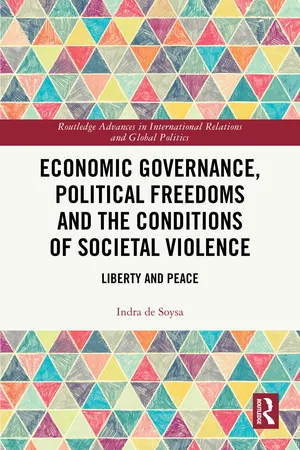
Economic Governance, Political Freedoms and the Conditions of Societal Violence
Liberty and Peace
- English
- ePUB (mobile friendly)
- Available on iOS & Android
Economic Governance, Political Freedoms and the Conditions of Societal Violence
Liberty and Peace
About this book
This book shows how the underlying causes of civil war and political violence are based in concrete conditions relating to economic governance. The author argues that what matters for cauterizing the potentiality of "sustainable" violence is economic governance, specifically growth-promoting governance that maximizes returns to investment due to competitive free-market processes upheld by the rule of law and the protection of private property rights. The arguments are assessed against three major forms of societal violence—civil wars, one-sided violence by states against ordinary citizens, and interpersonal violence that results in mortality.
Political and economic rights and freedoms are clearly intertwined, but there may be advantages to prefacing one over another. This study shows why and how economic governance matters for generating civil peace, perhaps more so than rival perspectives based on the understanding that violence is motivated by political concerns and grievances that motivate people to rebel broadly. The book demonstrates that the organization of violence that is sustained over long periods of time is far more narrowly focused than the loud discourses generated by violence itself predict. Even if people have legitimate reasons for contesting a government's policies, such concerns become side-tracked, even abandoned, for reasons that may trump the necessity of compromise; namely, because more narrowly organized groups may have advantages for organizing violence and surviving sanction. The mechanism through which this may occur is the primary focus of this book. The author examines quantitative data but uses empirical detail from Sri Lanka as a case study. Relying on a variety of historical sources on the Sri Lankan conflict to guide the discussion, the author uses data collected by a host of individuals and agencies in the statistical analyses that follow.
The work demonstrates that economic governance matters more than the political mechanisms most often argued in the literature. It will be of interest to those studying South Asian Politics, economic development, sociology, history, law, international relations, cultural studies, and peace, security, and conflict studies.
Tools to learn more effectively

Saving Books

Keyword Search

Annotating Text

Listen to it instead
Information
Table of contents
- Cover Page
- Half Title page
- Series Page
- Title Page
- Copyright Page
- Dedication
- Contents
- Acknowledgement
- 1 A Capitalist Civil Peace?: Identifying the Mechanism
- 2 The Shape of Armed Violence: Does Politics Trump Economics?
- 3 Critically Assessing Rival Theory: Push Back on Grievance
- 4 Explaining the Capitalist Civil Peace: The Organizational Logic
- 5 Empirics of the Onset of Civil War: Data, Methods, and Replications
- 6 Peace is Not Peace!: Economic Governance, Grievance, and Gratification
- 7 Interpersonal Violence: Economic Freedom, Shadow Markets, and Criminogenity
- 8 The Governance Imperative: Some Conclusions, Recommendations for Policy, and Future Research
- Index
Frequently asked questions
- Essential is ideal for learners and professionals who enjoy exploring a wide range of subjects. Access the Essential Library with 800,000+ trusted titles and best-sellers across business, personal growth, and the humanities. Includes unlimited reading time and Standard Read Aloud voice.
- Complete: Perfect for advanced learners and researchers needing full, unrestricted access. Unlock 1.4M+ books across hundreds of subjects, including academic and specialized titles. The Complete Plan also includes advanced features like Premium Read Aloud and Research Assistant.
Please note we cannot support devices running on iOS 13 and Android 7 or earlier. Learn more about using the app